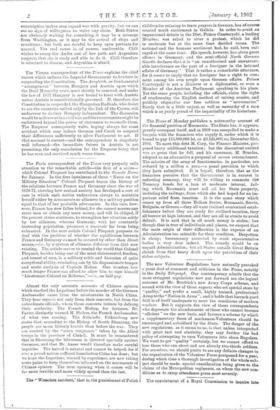The Times of Monday publishes a noteworthy account of the
financial position of Roumania. The State has, it appears, greatly overspent itself, and in 1899 was compelled to make a bargain with the financiers who supply it, under which it is bound to pay 175,000,000 lei, or £6,125,000, on December 31st, 1904. To meet this debt M. Carp, the Finance Minister, pro- posed heavy additional taxation; but the discontent excited was so great that he fell, and his successor, M. Sturdza, adopted as an alternative a proposal of severe retrenchment. The salaries of the army of functionaries, in particular, are reduced by a million a year,—a penal provision to which they have submitted. It is hoped, therefore, that as the financiers perceive that the Government is in earnest in enforcing economy, they will be willing to commute the Treasury bonds for a loan at moderate interest, fail- ing which Roumania must sell all her State property, including the railways, from which she had hoped for an im- portant relief from taxation. It is the same story which comes up from all these Balkan States, Roumania; Servia, Bulgaria, or Greece,—they all want civilised armies:and estab- lishments before they are ready for civilised taxation, they all borrow at high interest, and they are all in straits to' avoid default. It is said that in all much money is stolen; but though that is true of individuals and places, we suspect that the main origin of their difficulties is the expense of an Administration too scientific for their condition. Despotism is cheap ; bureaucracy corrected by weak representative bodies is very dear indeed. The remedy would be an unpaid Administration; but all States outside Great Britain shrink from that heavy draft upon the patriotism of their richer subjects.






































 Previous page
Previous page